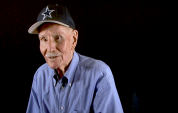5:44 | Near the end of the war, Frank Johnson led a small team of men to conduct shell reports to pinpoint a German battery that was harassing the infantry. This involved examining the patterns of soil in shell craters and led to several awards and a promotion. (This interview made possible with the support of WILLIAM C. ALEX.)
Keywords : Frank Johnson George Patton Bastogne Belgium Saarlautern Germany Chemnitz Dresden Munich shell reports artillery German Bronze Star promotion Dachau Mondsee Austria Braunau

In 1940, Frank Johnson transferred to LSU and joined ROTC. At Officer Candidate School, he became involved with Sound and Flash Ranging, which used audio and visual technology to locate enemy artillery. He attended that school and joined the 7th Field Artillery Observation Battalion. (This interview made possible with the support of WILLIAM C. ALEX.)
The reason Frank Johnson was in artillery dated back to his ROTC days, when he wanted a room near his friend. He joined a unit hear his home, but he wasn't near for long. It was time for a trip in a convoy to England. (This interview made possible with the support of WILLIAM C. ALEX.)
When he got to England, Frank Johnson was billeted in the home of a very nice English couple, where he drilled on an immaculate cricket field. Then he moved to Salisbury, right next to Stonehenge. While there, he saw General Patton speak to an assembly of officers. A few weeks after D-Day, it was his turn to cross the English Channel. (This interview made possible with the support of WILLIAM C. ALEX.)
After watching the bombing of Saint-Lo, Frank Johnson moved south and then east with Patton's 3rd Army. He was in a specialized Sound and Flash Ranging unit that spotted enemy artillery, but it was a while before he used the technology, which involved miles of wire and microphones. (This interview made possible with the support of WILLIAM C. ALEX.)
On the push across France into Germany, Frank Johnson spent a night in the old WWI trenches at Verdun. He was at Metz for two months in a siege of an old fort, where the Germans refused to surrender. He made his first foray into Germany at the town of Saarlautern. (This interview made possible with the support of WILLIAM C. ALEX.)